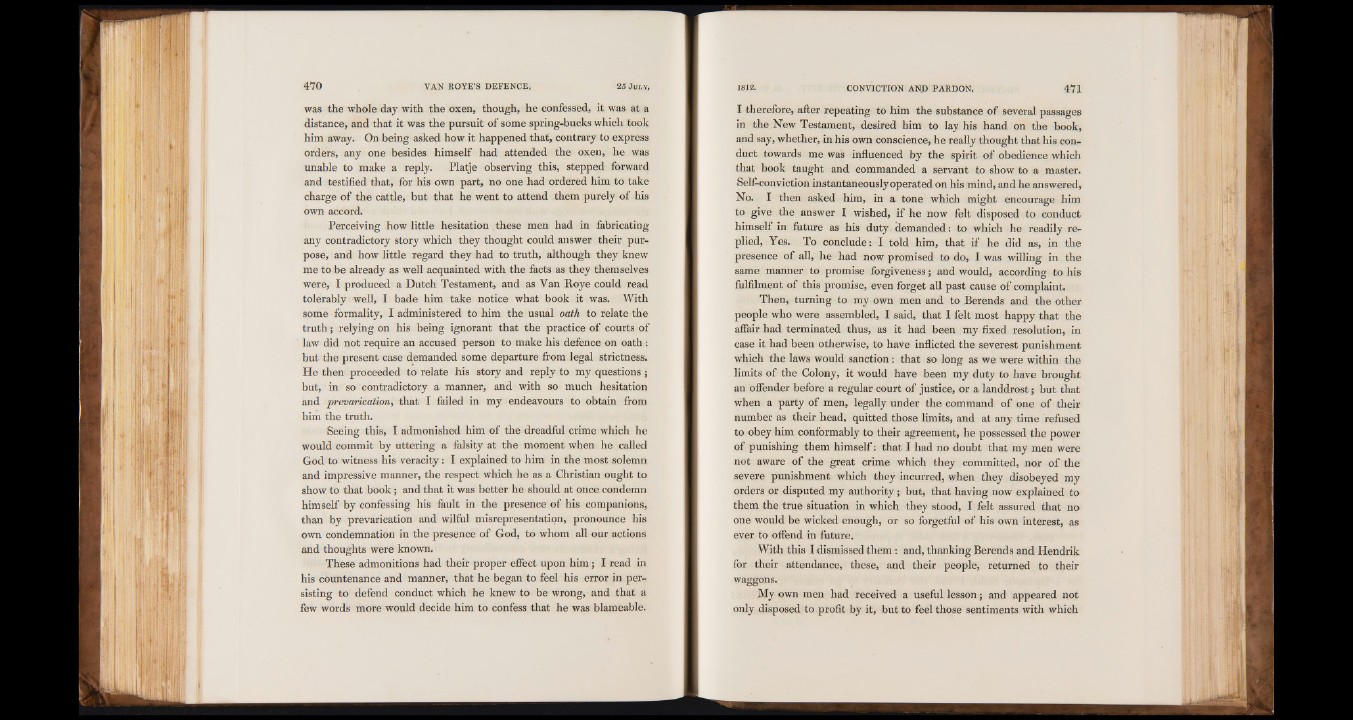
was the whole day with the oxen, though, he confessed, it was at a
distance, and that it was the pursuit of some spring-bucks which took
him away. On being asked how it happened that, contrary to express
orders, any one besides himself had attended the oxen, he was
unable to make a reply. Platje observing this, stepped forward
and testified that, for his own part, no one had ordered him to take
charge of the cattle, but that he went to attend them purely of his
own accord.
Perceiving how little hesitation these men had in fabricating
any contradictory story which they thought could answer their purpose,
and how little regard they had to truth, although they knew
me to be already as well acquainted with the facts as they themselves
were, I produced a Dutch Testament, and as Van Roye could read
tolerably well, I bade him take notice what book it was. With
some formality, I administered to him the usual oath to relate the
truth; relying on his being ignorant that the practice of courts of
law did not require an accused person to make his defence on oath:
but the present case demanded some departure from legal strictness.
He then proceeded to relate his story and reply to my questions ;
but, in so contradictory a manner, and with so much hesitation
and prevarication, that I failed in my endeavours to obtain from
him the truth.
Seeing this, I admonished him of the dreadful crime which he
would commit by uttering a falsity at the moment when he called
God to witness his veracity: I explained to him in the most solemn
and impressive manner, the respect which he as a Christian ought to
show to that book; and that it was better he should at once condemn
himself by confessing his fault in the presence of his companions,
than by prevarication and wilful misrepresentation, pronounce his
own condemnation in the presence of God, to whom all our action^
and thoughts were known.
These admonitions had their proper effect upon him; I read in
his countenance and manner, that he began to feel his error in persisting
to defend conduct which he knew to be wrong, and that a
few words more would decide him to confess that he was blameable.
I therefore, after repeating to him the substance of several passages
in the New Testament, desired him to lay his hand on the book,
and say, whether, in his own conscience, he really thought that his conduct
towards me was influenced by the spirit of obedience which
that book taught and commanded a servant to show to a master.
Self-conviction instantaneously operated on his mind, and he answered,
No. I then asked him, in a tone which might encourage him
to give the answer I wished, if he now felt disposed to conduct
himself in future as his duty demanded: to which he readily replied,
Yes. To conclude : I told him, that if he did as, in the
presence of all, he had now promised to do, I was willing in the
same manner to promise forgiveness; and would, according to his
fulfilment of this promise, even forget all past cause of complaint.
Then, turning to my own men and to Berends and the other
people who were assembled, I said, that I felt most happy that the
affair had terminated thus, as it had been my fixed resolution, in
case it had been otherwise, to have inflicted the severest punishment
which the laws would sanction: that so long as we were within the
limits of the Colony, it would have been my duty to have brought
an offender before a regular court of justice, or a landdrost; but that
when a party of men, legally under the command of one of their
number as their head, quitted those limits, and at any time refused
to obey him conformably to their agreement, he possessed the power
of punishing them himself: that I had no doubt that my men were
not aware of the great crime which they committed, nor of the
severe punishment which they incurred, when they disobeyed my
orders or disputed my authority; but, that having now explained to
them the true situation in which they stood, I felt assured that no
one would be wicked enough, or so forgetful of his own interest, as
ever to offend in future.
With this I dismissed them : and, thanking Berends and Hendrik
for their attendance, these, and their people, returned to their
waggons.
My own men had received a useful lesson; and appeared not
only disposed to profit by it, but to feel those sentiments with which